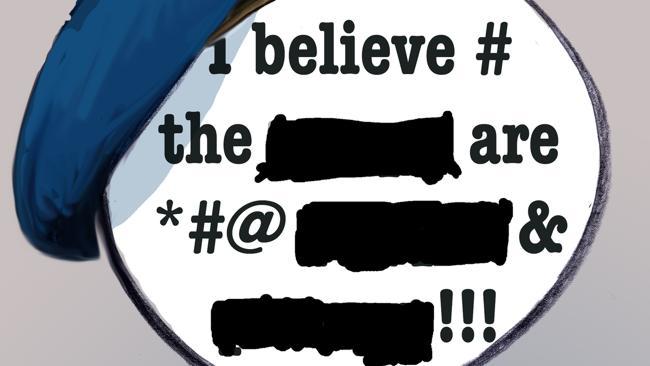
IF Andrew Bolt’s show trial was supposed to teach him a lesson it plainly didn’t work, judging from the tone of his questions to Labor’s Richard Marles on Sunday morning.
The 21 people jailed for terrorism-related offences, Bolt claimed were “all Muslim”.
Marles was not prepared to let that one slip.
“You seem to be drawing a distinction between, in the question you ask, between Christian Australians and Islamic Australians,” he said.
“If we see this kind of debate go down a path which seeks to vilify people of that faith, it makes their liberties, and their rights to enjoy their life in their country — our country — much more difficult.
“So I think we need to be careful, then, about how we conduct this debate … Let’s get the basics right before we start walking down unsettling paths.”
Smug arguments like this might once have gone unnoticed, but with the head-hacking in the caliphate showing little sign of abating, a quaint discussion about the avoidance of “unsettling paths” seems to miss the point.
There are no easy solutions to home-grown Islamist terrorism or to the community tension it provokes, but discouraging the use of the I-word won’t make it go away.
The obsession with the avoidance of “inappropriate” language, even at the expense of open debate about matters of national importance, is an unfortunate ingrained habit.
The reaction to the government’s modest amendments to the Racial Discrimination Act shows that the onus of proof now rests upon those who would justify free speech, not upon those who would restrict it.
George Brandis’s Freedom of Speech Bill may not have received the reception he might have hoped for, but it has at least flushed out the true conservative forces in Australia and exposed the paucity of their arguments.
“The FS Bill has been used as political tool,” wrote the ACTU in its submission to the Attorney-General, “to popularise the concept of freedom of speech in Australia.”
It might surprise the ACTU to learn that free speech is, and always has been, popular among Australians, a people with a hard-won reputation for speaking their minds.
It is a country of “informality, bloody-mindedness, individualism, self-reliance”, wrote the British politician Daniel Hannan recently. “Here, in short, is Mill’s libertarian philosophy made flesh.”
Yet most of the thousands of submissions the Attorney-General received favoured the status quo, arguing that restrictions on free speech were less onerous than the risk of giving offence.
Who can tell whether the views of, say, the West Australian Somali Cultural Awareness Association were broadly in line with those of the public? Ditto the views of the Aboriginal and Torres Strait Islander Reference Group, the Secretariat of National Aboriginal and Islander Child Care, the Australian Tamil Congress, the Australian Lawyers Alliance, Aboriginal Legal Service of WA (Inc), the Muslim Legal Network, the WA Muslim Lawyers Association and many, many more.
Race Discrimination Commissioner Tim Soutphommasane summed it up — sort of — in last Wednesday’s The Canberra Times: “The members of ‘Team Australia’ have said unambiguously that the act should stay as it is.” Soutphommasane’s Team Australia should not be confused with that of Tony Abbott, who used the term last week to describe the broad national consensus on matters of national security.
The Race Discrimination Commissioner, on the other hand, employs Team Australia as a euphemism for the new establishment, the enforcers of political correctness who remain firmly in control of most of Australia’s cultural institutions. On Thursday he told readers of The Age that the objections had “not just come from multicultural and Aboriginal communities”.
“The legal profession, human rights experts, psychologists and public health professionals have all objected to weakening laws against racial vilification.”
Indeed, we had rather expected they would. The repeal of 18C was a disruption to the grievance industry’s business model that they could not countenance. Its flaws are self-evident, but like a diseased tree in a Tasmanian forest, its felling was unimaginable.
These are Australia’s true conservatives, the ones defending the cultural institutions they have either taken over or created in the 50 years since Donald Horne wrote The Lucky Country.
Horne’s list of special interest groups is relatively short: the wheat, sugar and wool lobbies, the churches, the RSL, the four newspaper groups, BHP, the Chamber of Manufacturers and the unions in the Labor Party.
Today’s list would be many times longer, but like the reactionaries in 1964, their grip on the levers of cultural power is less secure than they imagine. There is precious little support for their worn-out causes outside of the beret-wearing zone.
The survival of clause 18C will ultimately prove a hollow victory. The chances of its illiberal provisions being exploited again in a case like the one brought against Bolt are practically zero.
The toxic influence of the Bolt case on the climate of public debate is recognised as a price too high to pay by the wiser heads on both sides of the cultural divide.
The case started a backlash that destroyed the Gillard government’s restrictive anti-discrimination legislation and gave the Abbott government the motivation to reshape the Human Rights Commission. Tim Wilson’s appointment with special responsibilities for free speech has noticeably shifted the body’s focus.
Brandis, it should be noted, played a key part in both those achievements, a fact that should not be forgotten, despite the defeat of his Freedom of Speech Bill.
In the end, the real issue is not 18C but the illiberal climate that encouraged the complainants in the Bolt case to pursue their audacious case.
The pain of dashed expectations is acute for the many who wanted 18C off the statute books. Yet for the first time in decades the rights industry is fighting to hold its ground rather than planning its next grand adventure.


